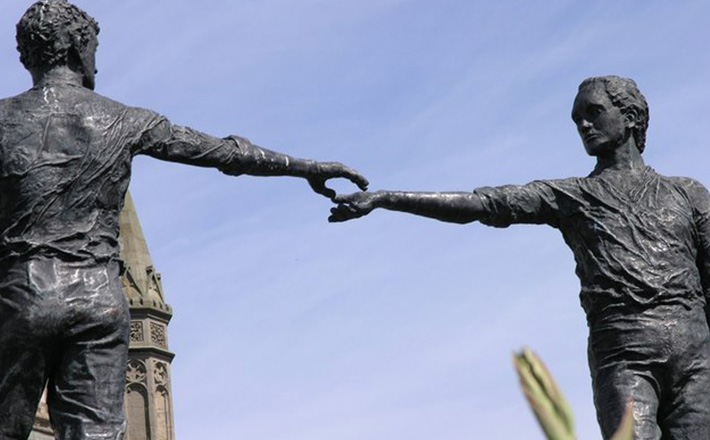Commentary on Psalm 119:1-8
The most important lessons get taught by accident.
Daniel Boyarin is one of the most learned people alive, and is busily showing us Christians just how Jewish our New Testament is. While lecturing here in Vancouver, he stopped for a sip of water, and the microphone caught him praying a prayer of gratitude in Hebrew for the water he was about to sip. He didn’t do it out of legalism or joyless duty. He seemed happy to have his thirst quenched so he could go on teaching about God. He also didn’t do it to teach us gentiles, but since then I’ve stopped before a sip of anything, and noticed its goodness slithering down, and given God thanks.
Psalm 119 is massive. I’m writing a commentary on the last third of the psalter for the Brazos Theological Commentary on Scripture and thankfully I get to skip this one. Why? Because another writer has an entire commentary, a whole volume, on this one psalm. It’s a microcosm of the whole psalter, a miniature of the whole. It’s the longest chapter in the bible. 176 verses. And it basically says the same thing over and over with slight modification: O Lord, how I love thy law.
There, you have the whole psalm. But, of course, you don’t. It’s long for a reason. It wants us to praise God with endless variation on this same theme. The psalm is simple, but not easy.1 It’s hard to even read the thing without your mind wandering. And that’s the point — to practice not having our mind wander as we contemplate the goodness of God’s law.
The monks I worship with say a bit of Psalm 119 every day. It’s like a one-a-day vitamin. Biting off a bit every 24 hours makes it possible to get through the whole Psalter every two weeks as St. Benedict laid down. Some of the older monks never open their psalters. They know the whole David by heart. And they don’t look unhappy reciting it. They look fully alive.
We Protestants have often known who we are by being not Jewish and not Catholic. We have criticized both for being legalistic, trying to earn salvation, trying to impress God with their piety so God will look at them one day and say You! Good job! You’re so religious! (the sort of thing we seminary professors say to our best students). And to this, we children of the Reformation have said no. Salvation is altogether gift. Given to the unworthy. All we can do is say thanks.
Here’s the problem. Do Jews really teach that you must earn salvation? Do Catholics? That faith is a matter of God giving out gold stars to the super astute? No. Even in Luther’s day, his teachers may have taught that salvation was earned, but Thomas Aquinas did not, neither did Catholics elsewhere in Europe, when they saw Luther’s complaints they couldn’t understand what he was on about.
The last two generations of biblical scholarship have shown that Israel’s relationship with God was steeped in grace, not in Israel’s own merit. So, what do we Protestants do when our gospel — that God saves the unworthy — is also embraced by Catholics and Jews? Weird eh? But maybe not. They both read Israel’s scripture. And Israel’s God saves by grace.
The first verses of this grandest of the psalms offer beatitudes: blessed, or happy, are those whose ways are God’s ways. Religion is often justly pilloried as joyless. Here God claims it is enchantment itself. These first eight verses begin to use some of the eight different Hebraic descriptions of the law in 119 — ordinances, commandments, statutes … one more than the seven days of creation, eight variations of God’s law. The one who praises God this way goes with enthusiasm and verve and passion, like a new convert, like someone newly in love, like a grandmother with her first grandchild (give me that baby!).
Psalm 119 is an acrostic poem. It goes through all 22 letters of the Hebrew alphabet and has a section that starts with each. So, the first eight verses all start with aleph, the second eight with bet and so on. Eight verses for each letter — it’s why the thing is so long. Some say this was a memory device. Others say a cosmic point is being made — God’s Torah reigns from A to Z, first to last.
The psalm is expansive, exhaustive, and exhausting, and it’s making a point. God’s law is delightful. Really. There is an old difference in the churches of the Reformation. Luther described Christ’s victory as being over sin, death, the devil, and the law. Quite some company for the law — one of the enemies Christ destroys. But Calvin differs. Calvin loves Psalm 119, “O Lord how I love thy law.” Calvin could pray that all day, just like Psalm 119 does.
There’s nearly nothing about the content of the law at all in this psalm. It goes on and on about how wonderful the law is, but never tells us what the law is. Not once! If this was the only chapter of the bible we had, we couldn’t reconstruct one of the ten commandments from it, let alone scripture’s 603 other commands. The psalm is an attitude adjustment, not a content dump.
Now some preachers have tried to revise our view of the law to be slightly more positive. Stephen Farris, my predecessor at VST compares the law to the instructions on a complicated toy — you’re sure glad to have them at midnight on Christmas eve. Others compare Psalm 119 to a map for a long pilgrimage. It would not be freedom to abandon that map, it’d be folly. Good analogies.
Think of the Jewish festival of Simchat Torah, a celebration of the giving of the law, where worshipers take turns dancing with the Torah. Delighting in it. The law isn’t a burden, it’s certainly not an enemy. The point of the law, Paul tells us, is Christ (Romans 10:4). No wonder the psalmist delights. And God’s people should dance with it.
Notes:
1 I take this distinction from Elaine Heath, new dean of Duke Divinity School.


February 12, 2017